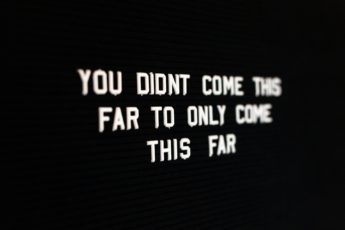A relationship is a connection. And what are we more connected to than food? While food is a source of energy, it is also a source of identity for many. It has cultural ties and emotional meaning. It is the foundation of many social gatherings. Food is everywhere and it is interwoven into many areas of our life, which is why it is so important for us to maintain a healthy relationship with our food.
Growing up, you may have had a a science class that touched on nutrition, but for the most part, you gained your nutritional knowledge and habits from those who raised you, what was available for school lunches, and what you heard/read/saw on media. The relationship you have with your food as an adult is influenced by the knowledge and habits you have acquired over the years. Some parts of that relationship may be healthy and some may be unhealthy.
What's considered an unhealthy relationship?
The World Health Organization defines “health” as “a state of complete physical, mental and social well-being and not merely the absence of disease or infirmity” (“Frequently asked questions”, 2020). Using this definition, we can say that a healthy relationship would be one that promotes complete physical, mental, and social well-being. Therefore, an unhealthy relationship would be one that does not promote the complete well-being of one or more of these areas.
An unhealthy relationship with food could be an extreme focus on the impacts food has on you physically, while mentally and socially, your well-being is suffering. It could be the use of food to deal with mental well-being, while your physical well-being is not be cared for. It could also be the use of food to fulfill a part of physical well-being, such as current hunger, but neglect another part of physical well-being, such as a prediabetic condition.
For example, using food as your sole coping mechanism for stress, but disregarding the physical health impacts it has on you, is unhealthy. It is not necessarily an abuse, but it is not taking in consideration your entire well-being. Another example would be an extremely social person cutting off all social interactions when they are dieting. In this example, that person is only thinking of their physical well-being and neglecting their social well-being.
An unhealthy relationship with food will look different for everyone as everyone has different needs and desires. What promotes one person’s well-being may be detrimental to another. However, below you will find some common signs that indicate that a food relationship is or is becoming unhealthy.
1. The intensity is high.
You started your new diet and you were really dedicated to it. You emptied your whole fridge and pantry, stocked up on your new diet essentials, meal prepped, told all your family and friends, and it felt good….for the first week. Then you kind of just fell off and when you fell off, you went way off. You binged on all the “bad” food. After a few days of binging, you decide you need to be super strict so you find a new diet or go back to the same diet and tell yourself…”This time it will be different.” If this sounds like you or if you tend to go on highs and lows of dieting, then you may have an unhealthy relationship with food.
People tend to start this unhealthy habit due to a wish to be at their ideal physique in an unrealistic time frame and with unrealistic lifestyle changes. The intensity fluctuates based on the focus at the moment. While strict dieting, all the focus is on physical well-being (or at least a part of physical well-being) and while focused on that, the mental and/or social well-being get neglected. This leaves your mental and/or social well being depleted, which in turns impacts your ability to maintain focus, energy, and consistency on your physical well being so you fall off the strict dieting and maybe even fitness routines. When you fall off, you now begin to focus on trying to regain some stability in mental and/or social well-being. The strict diet helped you with physical goals, but it didn’t help you set up nutritional boundaries in relation to your mental and/or social habits and without those boundaries, you return to those habits and due to the wish to return to stability as quick as possible, the habits become more extreme.
2. You feel ashamed and/or guilty after eating.
You’ve been taught there is “good” food and there is “bad” food. And when you eat that “bad” food, no matter how much you ate, you feel horrible about yourself. You feel embarrassment, shame, and disappointment. Eating this “bad” food hurts your self-esteem and causes you to think negatively about yourself. You may find that you try to hide all the “bad” food from yourself so you don’t eat it, or you may hide that you are eating this “bad” food so others won’t judge you they way you think they do.
A lot of times, when people have this “good” and “bad” idea of food, they are thinking about how the food impacts physical well-being. They have been taught that this “bad” food will make you fat. This mentality overestimates the impact of food on the physical well-being and doesn’t consider the mental and social impacts it has.
3. Your life revolves around the food rules.
Your nutrition plan possesses you. You can’t go out with your friends or celebrate holidays. You can’t eat lunch with your co-workers or make a call for delivery. If you do, well then you’d be cheating on your nutrition plan. You feel you won’t get anywhere if you don’t stick to your nutrition plan 100% and right now, you just don’t trust yourself in situations where there could be temptation.
4. Food is all about the calorie count.
This was me at one point. I could look at food and know roughly how much calories were in it. I was constantly tracking all my calories used and consumed. I was obsessed. Food became just fuel and about how it impacted me physically.
5. You can't remember the last time you weren't on a diet.
You may be on the same diet you have been on for years or maybe you switch diets every few weeks. Either way, you can’t remember a time that you weren’t dieting.
When I say diet in this case, I mean, a nutritional plan that is outside of what you would eat in order to maintain your current physical well-being. This diet could be to lose weight or gain weight. If you have remained consistent on a diet plan for a long time, then maybe you are just staying on the diet until you have reached your physical goals and then you will transition to a nutrition plan to maintain at. As long as other areas of your life aren’t suffering and the diet is progressing you to your goals, then its healthy. However, if you are maintaining a diet, but aren’t progressing towards your goals, then it isn’t promoting your entire well-being, and finding a nutrition plan that meets your needs should be a priority. On the other hand, if you have stayed on a diet and have got the results you’ve desired, but are scared to get off the diet due to fear of losing your results, then it’s important to reflect on what you need now. Nutrition plans evolve based on your needs.
6. Other areas of your life are falling apart.
You stopped making time for your friends. Your boss is getting mad at you for not performing your best at work. You haven’t done your laundry in weeks and your car is a mess. You are tired all the time (or maybe you feel restless). Even on the goals you are most focused on, you have lost motivation and can’t seem to make progress.
If this sounds like you, it’s likely you spent a lot energy and focus on one area of your life and neglected the other areas. And even when those areas were depleted, you pushed through and continued to neglect them to focus on that one area. We are only as strong as our weakest link. While physical, mental, and social well-being are separate, they are dependent on one another. When one or more becomes too fatigued, it impacts the other area(s).
7. It becomes physical.
A tell-tale sign that it has become physical is that a doctor has told you that you have health issues that are due to your eating habits. A more subjective sign may be that you have noticed unwanted changes in clothes size, in the mirror, and/or weight.
8. You just keep eating "unhealthy" foods.
You ever meet a person who always dates the “wrong” person? And the more they talk, you realize that those people that they dated probably aren’t the best, but the common denominator is that person. Most food, in itself, isn’t unhealthy. There are foods that have more nutritional value and there are foods that will help you reach certain physical well-being goals. A food being healthy or not is really dependent on your entire nutritional intake. This comes down to setting up boundaries, in many cases.
Making it Healthy
If you identify with one or more of these areas or you have concerns that you have an unhealthy relationship with food, then use the posts below to take steps to make your relationship healthy. That might mean dumping your current nutrition plan, but it could also mean just making adjustments to address the areas causing concern. Setting healthy boundaries will allow you to manage your needs while reaching your goals. Choosing the right nutrition plan will help you remain consistent and reach new potentials in all areas of your well-being. And, finally, keeping yourself accountability and rewarding yourself will provide motivation and will also help with consistency.
Set Healthy Boundaries
Choose the Right Nutrition Plan for You.
Learning how to hold yourself accountable and reward yourself.
“Health is the greatest gift.” -Buddha
-Samson 7/6/2020
Resources Used:
.Frequently asked questions. (2020). Retrieved 3 July 2020, from https://www.who.int/about/who-we-are/frequently-asked-questions






